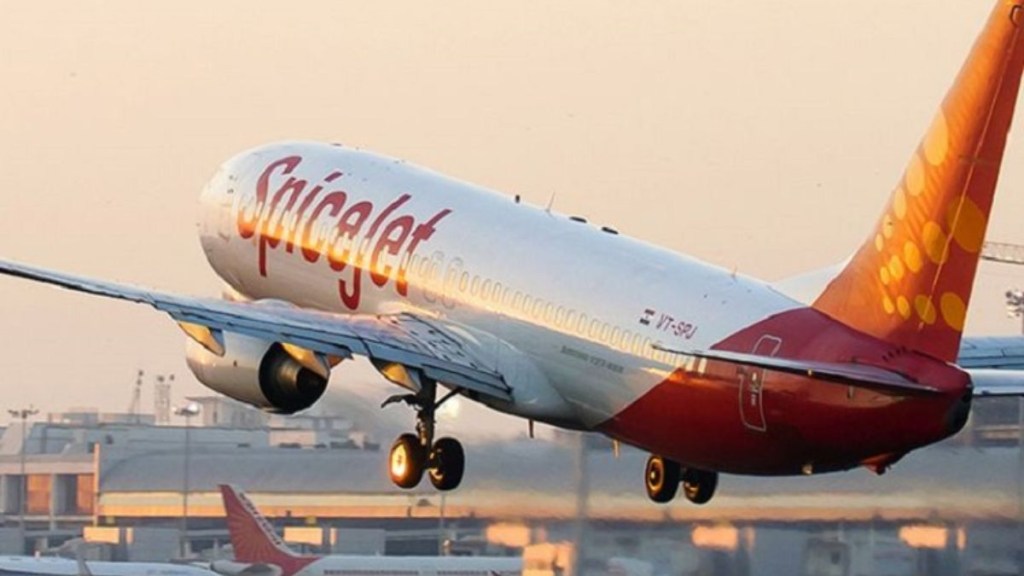The Delhi High Court’s order, directing low-cost carrier SpiceJet to ground three aircraft engines due to unpaid lessor invoices, was rejected by the Supreme Court on Friday. A bench comprising Chief Justice D Y Chandrachud, Justices J B Pardiwala and Manoj Misra dismissed SpiceJet’s appeal against the September 11 high court verdict. “We will not interfere. It’s the correct order,” the bench said.
After the court’s order, a SpiceJet spokesperson said the company is currently in discussions with the aircraft lessor to reach an amicable settlement. “It is important to note that two of the three engines in question are already grounded, and our operations remain completely normal and unaffected. We remain committed to ensuring seamless operations,” the SpiceJet spokesperson said.
A division bench of the Delhi High Court rejected a single-judge court’s judgement directing the low-cost airline to halt the three engines owing to payment delinquency, ruling that the carrier had breached an agreed-upon temporary arrangement for payment of dues.
What had happened?
On August 14, the high court’s single-judge panel ordered SpiceJet to stop using three of its engines by August 16 and give them to their lessors, Sunbird France 02 SAS and Team France 01 SAS. SpiceJet’s appeals against the single-judge bench’s August 14 order to ground the three aircraft engines and turn them over to the lessors were dismissed by the high court’s division bench, which also declined to intervene.
SpiceJet had contested the single-judge bench’s August 14 order. “The appeals are emblematic of the adage that fools create assets and wise men use them. The use of a lessor’s assets without recompense, on agreed terms, by the lessee often leads to consequences which disrupt the interests of both sides,” the high court had said.
According to the high court, SpiceJet was in default and there were still unpaid past and present outstanding debts. This was evident from the records. “At the risk of repetition, it must be stressed that SpiceJet has violated an agreed interim arrangement for payment of dues, which included a term that upon breach, it would ground the engines that Team France and Sunbird France could then repossess,” it had stated.
The second need, according to the top court, was likewise satisfied because the engines were depreciating assets and the lessors would not benefit much from their use if they were not compensated. “SpiceJet’s actions and the position it took in court, that it is trying to inject capital through loans and/or equity, make it clear that its financial situation is precarious,” it stated. It further said that given SpiceJet’s current situation, Team France and Sunbird France may find themselves without engines or the money owed under the terms of their engine lease agreements. Thus, from Team France’s and Sunbird France’s perspective, monetary compensation does not appear likely.
It stated that the lessors might forfeit both their assets, the engines and the money, if they are unable to exercise their contractual rights at this point. On motions from the lessors asking SpiceJet to transfer ownership of the three engines upon the expiration of the lease agreements, the single judge rendered the decision.
The pleas said that the plaintiffs had instructed the airline to ground the aircraft, re-deliver the engines and settle all outstanding debts after the termination, but the airline had failed to do so. “It is, however, clarified that the defendant will remain liable for making payments, which it undertook in an order dated May 29, 2024, towards the admitted outstanding of $4.8 million and towards the weekly payments arising on account of the use of the engines under the aegis of this court,” it said. The court further stated that the return of engines does not absolve the defendant from its liability for the payments, which have admittedly fallen due, and to that extent, the plaintiff is entitled to recover the said amount from the defendant through execution of the order dated May 29, 2024.
SpiceJet is a “defaulter and has no legal and contractual right to continue the use of the engines,” according to what it had stated.
What did the airline say?
The airline’s attorney had stated in its answer to the petitions that the defendant paid $7.18 million between December 14, 2023 and May 24, 2024, following the commencement of the lawsuit. The airline paid $1.48 million after the settlement conditions were recorded in court, according to the attorney.
As of August 12, there was an acknowledged default to the tune of $2.67 million towards the remaining balance. He said that although the defendant acknowledges that there has been a default, it is attempting to make these defaults more regular and had requested an extension of time until September 30 to settle the outstanding balance.
(with PTI inputs)
